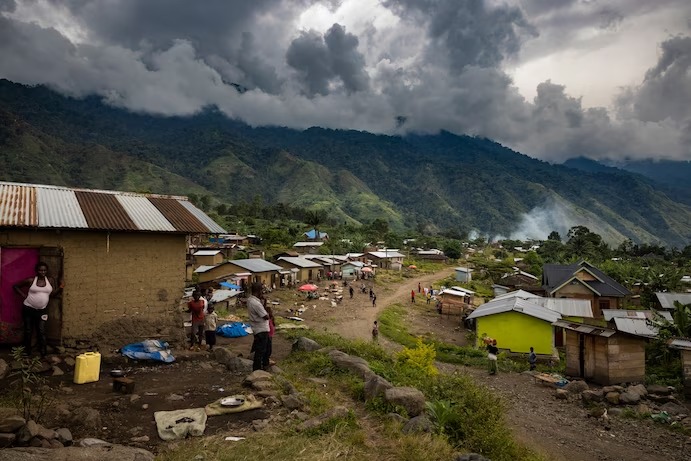BENI, Democratic Republic of Congo — Deep in Congo’s forested ravines, a local affiliate of the Islamic State has been growing increasingly deadly — seizing children to swell its ranks, honing its bombmaking skills, and launching ferocious attacks on villages, churches and clinics — without attracting much international attention.
The Allied Democratic Forces (ADF) has also widened its recruitment from elsewhere in Africa and the Middle East and has plugged itself into foreign financing networks that help fund its campaign of bombings, according to investigators from the United Nations and the U.S.-based Bridgeway Foundation. This year has been the group’s bloodiest yet.
The ADF was founded decades ago in neighboring Uganda with the aim of overthrowing that country’s government, which eventually pushed the group’s fighters over the border into the forested mountains of the Democratic Republic of Congo. The group’s ambitions broadened after its founder was arrested in 2015 and a new leader, former religious judge Musa Baluku, took over. Desperate for funds, Baluku vowed allegiance to the Islamic State.
The resulting influx of money began at a time when the group had almost stopped conducting attacks. Since then, the ADF has carried out a wave of bombings and attacks, killing thousands of civilians. In June, the ADF targeted a school near the Uganda-Congo border, leaving 41 dead. Most were children. They were burned alive.
One Congolese boy who recently escaped from the ADF recounted its brutality. He was only 12 when fighters raided his town, Bulongo, hacked his mother and father to death in front of him, and then seized him and his brother. The boy, whose name is being withheld to prevent reprisals, said they were marched into the jungle, where commanders gave them military training.
“Their job was killing people,” he said flatly.
The boy was among 11 escapees interviewed for this article, along with victims of the attacks, Congolese military officers, security officials and religious leaders, among others. Some of the escapees said that boys as young as 10 are trained as fighters and that girls mostly become sex slaves, either gang-raped or forcibly “married” to a commander.
The boy said he had been forced to participate in an attack on another village and recalled watching as a Tanzanian bombmaker instructed other recruits on explosives. The Tanzanian, Ahmed Mohamood, also piloted drones used to surveil targets and monitor attacks. The boy strained to decipher a babel of tongues as foreign recruits crowded into the camp, named Medina for one of Islam’s most holy cities. While the commanders were mostly Ugandan, there were also several Somalis, Rwandans and Tanzanians, he said.
Once, the boy said, Mohamood motioned him over and said softly: “Your mother is dead. If you try to run, you will also be killed.”
But finally, abandoning his brother, he did.
In recent years, the Islamic State’s international operations have become more fragmented. Its loss of its so-called caliphate in Syria and Iraq coincided with the strengthening of local affiliates in Afghanistan, the Sahel region of Africa and — far less publicly — central Africa.
In 2017, the first documented cash transfers from the Islamic State to the ADF took place. Two years later, the Islamic State announced the debut of the Islamic State Central Africa Province affiliate, which included the ADF. The U.S. government imposed sanctions in 2021 on the ADF, calling it an Islamic State affiliate.
The ADF’s decision to affiliate with the Islamic State initially faced internal dissent. A 16-year-old girl who had spent eight years with the ADF before escaping said Mohamood had arrived in Congo with a black flag and a demand: Swear allegiance or be attacked. The ADF’s founder, Jamil Mukulu, had always opposed the Islamic State, and his son, Moses, now spoke out against joining the group. Moses was beheaded by other ADF fighters, she said, and two other senior commanders who also opposed the Islamic State were beaten to death. Other interviewees confirmed her account.
A U.N. panel of experts, for the first time, detailed links between the ADF and the Islamic State in June. Both the United Nations and Bridgeway mapped out how the ADF received funds from a South African cell that worked with a Sudanese Islamic State operative. That operative, known as Bilal al-Sudani, was killed in a U.S. military raid on a Somali cave complex earlier this year.
Although its initial explosive devices were crude and ineffective, the ADF’s bombmaking capacity has been increasing. Last year, the group carried out its first suicide attacks, including an attack by a woman that killed eight people in a military bar. In January, the group bombed a church in Kasindi, a small town on the Congo-Uganda border, killing 16 people and wounding 62.
The ADF’s influence has also been felt elsewhere in Africa. Dino Mahtani, a former U.N. sanctions monitor, has documented links between the ADF and the Islamist insurgency in Mozambique, which has shut down a multibillion-dollar gas project, killed thousands of civilians and displaced more than 800,000 people.









































